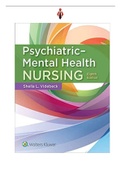,Psychiatric-Mental Health
Nursing
8 Ed.
by Sheila L. Videbeck PhD
RN
Test bank
2021
,Psychiatric-Mental Health Nursing 8th edition by Videbeck Test Bank
Chapter 1 Foundations of Psychiatric Mental Health Nursing
Chapter 2 Neurobiological Theories and Psychopharmacology
Chapter 3 Psychosocial Theories and Therapy
Chapter 4 Treatment Settings and Therapeutic Programs
Chapter 5 Therapeutic Relationships
Chapter 6 Therapeutic Communication
Chapter 7 Client’s Response to Illness
Chapter 8 Assessment
Chapter 9 Legal and Ethical Issues
Chapter 10 Grief and Loss
Chapter 11 Anger, Hostility, and Aggression
Chapter 12 Abuse and Violence
Chapter 13 Trauma and Stressor Related Disorders
Chapter 14 Anxiety and Anxiety Disorders
(Chapter 15 Obsessive‐Compulsive and Related Disorders
Chapter 16 Schizophrenia
Chapter 17 Mood disorders and Suicide
Chapter 18 Personality Disorders
Chapter 19 Addiction
Chapter 20 Eating Disorders
Chapter 21 Somatic Symptom Illnesses
Chapter 22 Neurodevelopmental Disorders Chapter
Chapter 23 Disruptive Behavior Disorders
Chapter 24 Neurocognitive Disorders
Drone IT Page 1
, Psychiatric-Mental Health Nursing 8th edition by Videbeck Test Bank
Chapter 1
1. The nurse is assessing the factors contributing to the well-being of a newly admitted
client. Which of the following would the nurse identify as having a positive impact on
the individual's mental health?
A) Not needing others for companionship
B) The ability to effectively manage stress
C) A family history of mental illness
D) Striving for total self-reliance
Ans: B
Feedback:
Individual factors influencing mental health include biologic makeup, autonomy,
independence, self-esteem, capacity for growth, vitality, ability to find meaning in life,
emotional resilience or hardiness, sense of belonging, reality orientation, and coping or
stress management abilities. Interpersonal factors such as intimacy and a balance of
separateness and connectedness are both needed for good mental health, and therefore a
healthy person would need others for companionship. A family history of mental illness
could relate to the biologic makeup of an individual, which may have a negative impact
on an individual's mental health, as well as a negative impact on an individual's
interpersonal and socialñcultural factors of health. Total self-reliance is not possible,
and a positive social/cultural factor is access to adequate resources.
2. Which of the following statements about mental illness are true? Select all that apply.
A) Mental illness can cause significant distress, impaired functioning, or both.
B) Mental illness is only due to social/cultural factors.
C) Social/cultural factors that relate to mental illness include excessive dependency
on or withdrawal from relationships.
D) Individuals suffering from mental illness are usually able to cope effectively with
daily life.
E) Individuals suffering from mental illness may experience dissatisfaction with
relationships and self.
Ans: A, D, E
Feedback:
Mental illness can cause significant distress, impaired functioning, or both. Mental
illness may be related to individual, interpersonal, or social/cultural factors. Excessive
dependency on or withdrawal from relationships are interpersonal factors that relate to
mental illness. Individuals suffering from mental illness can feel overwhelmed with
Drone IT Page 2




